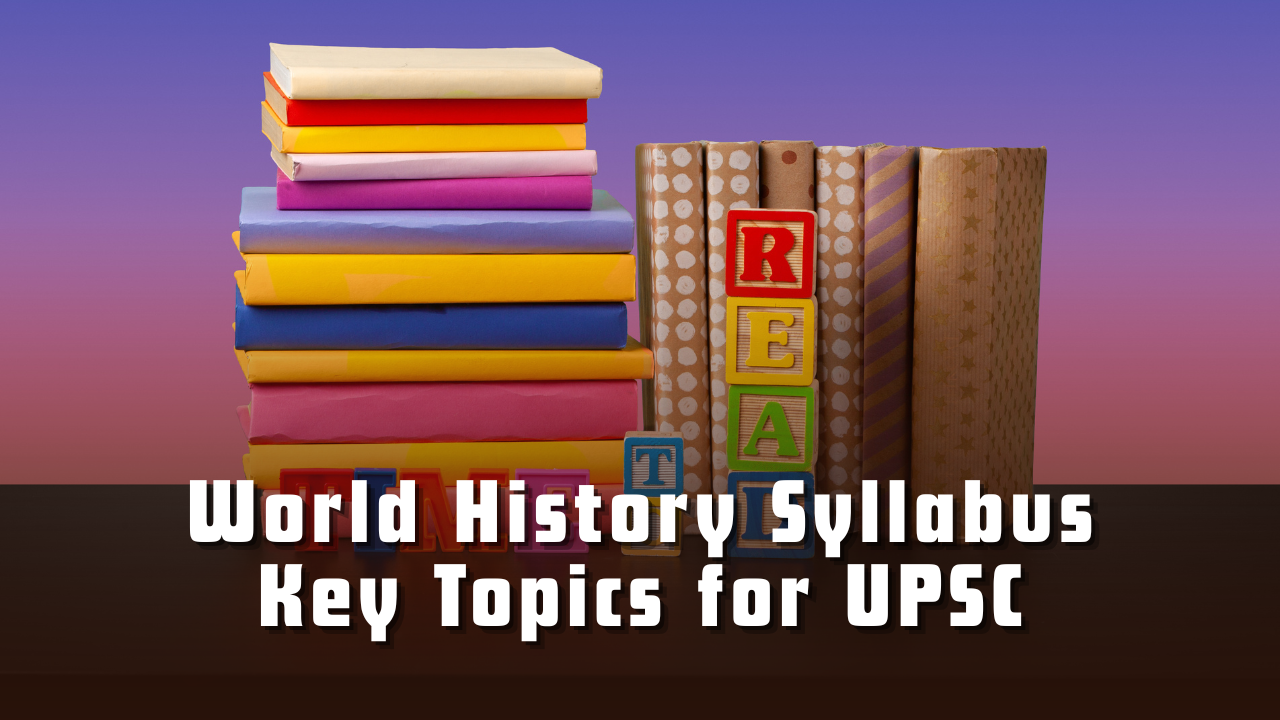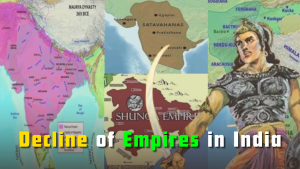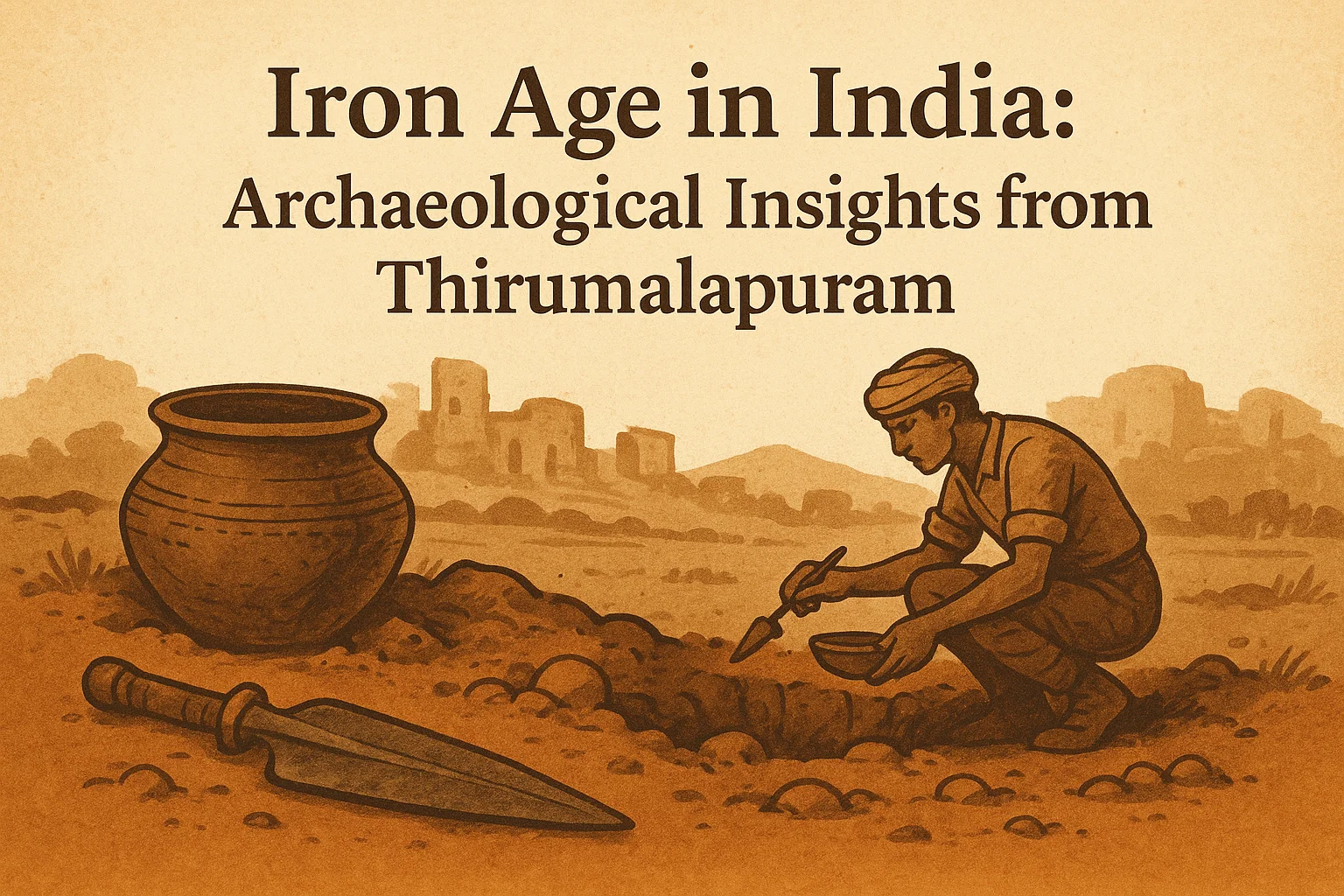World History Syllabus: Key Topics for UPSC
Understand UPSC World History syllabus with key themes, PYQs, ideologies, and strategy tips to boost GS Paper I preparation.

Introduction
World History plays a significant role in General Studies Paper I of the UPSC Civil Services Mains Examination. Though concise in syllabus terms, it holds immense weightage, especially in understanding modern political ideologies, revolutions, colonialism, and the evolution of international relations. A proper understanding of world history enables candidates to grasp current global geopolitics with a strong historical foundation.
This blog presents a comprehensive breakdown of the World History syllabus for UPSC, key topics, suggested topic-wise resources, preparation strategy, and previous year questions to guide aspirants toward structured and focused preparation.
UPSC World History Syllabus (GS Paper I)
The official UPSC syllabus mentions:
“History of the world will include events from the 18th century such as industrial revolution, world wars, redrawal of national boundaries, colonisation, decolonisation, political philosophies like communism, capitalism, socialism etc.—their forms and effect on the society.”
This line may seem brief, but it covers a wide span of transformative events in global history. Let’s decode the syllabus and discuss each key topic area in detail.
Major Themes in World History for UPSC
1. The Industrial Revolution (18th–19th Century)
- Origins in Britain: Causes such as agricultural revolution, availability of capital, scientific temperament, coal and iron deposits.
- Spread to Europe and the US: France, Germany, Belgium, and the USA in the 19th century.
-
Consequences:
- Rise of capitalist economies.
- Urbanisation, factory systems, and working-class movements.
- Social changes and emergence of socialism and trade unions.
- Impact on colonies and global trade patterns.
Important Concepts:
- Laissez-faire capitalism
- Luddites and working-class protests
- First and Second Industrial Revolutions
2. Political Revolutions and Nationalism
(a) American Revolution (1776)
- Background: British colonial policies, taxation without representation.
- Ideas: Enlightenment, republicanism, liberty.
- Outcomes: US Constitution, federalism, global influence on democratic revolutions.
(b) French Revolution (1789–1799)
- Causes: Social inequality, economic crisis, influence of Enlightenment.
- Phases: National Assembly, Reign of Terror, Rise of Napoleon.
- Consequences: Spread of republicanism, nationalism, and modern political ideologies across Europe.
(c) Latin American Revolutions (early 19th century)
- Role of leaders like Simon Bolivar.
- Anti-colonial struggles against Spanish and Portuguese rule.
- Creation of independent Latin American republics.
(d) Unification Movements: Italy and Germany
- Role of Cavour, Mazzini, Garibaldi (Italy)
- Bismarck and “Blood and Iron” diplomacy (Germany)
- Role of wars and diplomacy in national consolidation
3. Colonialism and Imperialism
- Colonial expansion in Asia, Africa, and the Americas.
- Tools of imperialism: economic control, missionary activities, military force, racial ideology.
- Scramble for Africa and the Berlin Conference (1884–85).
- British Raj in India in the broader colonial context.
Consequences:
- Economic exploitation, cultural erasure, political subjugation.
- Rise of resistance movements and nationalism in colonies.
4. World Wars and Global Conflicts
(a) First World War (1914–1918)
- Causes: Nationalism, militarism, alliance system, imperial rivalries.
- Events: Trench warfare, technological warfare, participation of colonies.
- Consequences: Treaty of Versailles, rise of US as a global power, economic depression.
(b) Interwar Period (1919–1939)
- League of Nations, disarmament failures.
- Economic crises: Great Depression and protectionism.
- Rise of fascism and Nazism in Europe.
(c) Second World War (1939–1945)
- Causes: Treaty of Versailles’ harshness, aggressive policies of Germany, Italy, Japan.
- Key Events: Holocaust, atomic bombing, global war theatres.
- Consequences: Formation of UN, bipolar world, beginning of decolonisation.
5. Cold War and the Bipolar World
- Ideological conflict: Capitalism (USA) vs Communism (USSR)
- Major events: Cuban Missile Crisis, Korean War, Vietnam War, Berlin Wall.
- Proxy wars and arms race.
- Space race and technological competition.
6. Decolonisation Post World War II
- Asia: India (1947), Indonesia (1949), Vietnam (1954), etc.
- Africa: Ghana (1957), Kenya, Algeria, South Africa.
- Factors: Nationalist movements, economic drain, UN support, Cold War politics.
Key Movements:
- Non-Aligned Movement (NAM)
- Bandung Conference (1955)
7. Disintegration of the USSR and the End of the Cold War
- Gorbachev’s reforms: Glasnost and Perestroika
- Fall of Berlin Wall (1989), End of USSR (1991)
- Unipolar world and rise of US hegemony
- New geopolitical alignments: NATO expansion, EU formation, global capitalism
8. Political Philosophies and Ideologies
- Capitalism: Free markets, private ownership (Adam Smith)
- Socialism: Redistribution, state ownership (Karl Marx, Lenin)
- Communism: Classless, stateless society (Marxist ideal)
- Fascism and Nazism: Totalitarian nationalism, racial supremacy
- Liberalism: Individual rights, democracy, freedom
Understanding these ideologies is crucial for both historical analysis and contemporary political understanding.
How to Prepare World History for UPSC?
Use Standard Books:
- NCERT Class 11 – Themes in World History
- Norman Lowe – Mastering Modern World History
- Arjun Dev’s “Story of Civilisation – Part 2” (Old NCERT)
- Jain & Mathur – History of Modern World
- BV Rao – History of Modern World
Key Tips for Answer Writing in World History
- Begin with historical context: Set the stage briefly with the background.
- Structure well: Use Introduction – Body – Conclusion format.
- Include dates, ideologies, and thinkers: But avoid overloading with facts.
- Use examples from multiple countries: For comparative analysis.
- Incorporate maps, diagrams, and timelines: If relevant.
- Link to present: If applicable, show how the event still affects global politics or India.
Common Mistakes to Avoid
- Ignoring ideological context while studying revolutions and wars.
- Focusing only on European history, neglecting Asia, Africa, Latin America.
- Memorising facts without understanding cause-effect relationships.
- Overemphasis on dates and names instead of analytical preparation.
Final Thoughts
World History, while not heavily emphasised in terms of the number of questions, carries immense analytical value. It enriches your understanding of political ideologies, global transformations, and institutional developments—skills that help not only in GS Paper I but also in GS II (International Relations), Ethics, and Essay papers.
By approaching it thematically and analytically, backed by correct resources, regular revision, and integration with current events, aspirants can score well in this section.
Quick Recap: Must-Cover World History Topics for UPSC
| Theme | Subtopics |
| Industrial Revolution | Causes, spread, effects |
| Revolutions | American, French, Russian, Latin American |
| Nationalism | Italy, Germany, Unification |
| Colonialism | Imperialism in Asia & Africa |
| World Wars | Causes, events, outcomes |
| Cold War | Ideology, proxy wars, collapse of USSR |
| Decolonisation | Asia, Africa, NAM |
| Political Ideologies | Capitalism, Socialism, Communism, Fascism |
Subscribe to our Youtube Channel for more Valuable Content – TheStudyias
Download the App to Subscribe to our Courses – Thestudyias
The Source’s Authority and Ownership of the Article is Claimed By THE STUDY IAS BY MANIKANT SINGH



